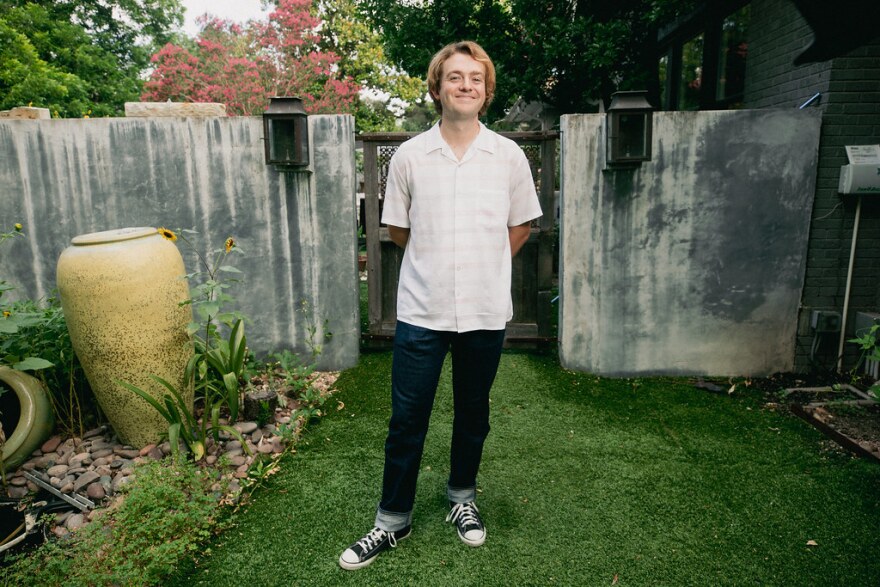Sloan Struble didn’t grow up in a music town. He grew up in Aledo, Texas, just west of Fort Worth. Aledo is known for its high school football team, the Bearcats. They’ve won the state championship nine times.
“I wasn't recreationally competitive, so I didn't fit in,” he says.
He turned to music. When he was 10, Sloan was introduced to Garage Band. He started writing songs, learning instruments and recording himself.
“I guess over time [I] got obsessed with plugins and production stuff and went from there,” he says.
Now Sloan goes by the artist name Dayglow. He writes all the songs for the project, plays all the instruments on the recordings, and records and mixes everything himself. He had already finished the first Dayglow record, Fuzzybrain, by the time he headed off to college at UT. He actually uploaded it from his dorm room, right after driving down from Aledo to Austin.
That was In 2018.
“I love Texas and I wanted to stay in Texas,” he says. “My dad was a Longhorn, so I had some history with being in Austin.
But there was another reason he moved to Austin: the music scene.
“I came to Austin because it's a creative place and I love the energy of the city; it's so fun,” he says. “There's so many great musicians here.”
That’s pretty common, says Michael Seman, an assistant professor of arts management at Colorado State University. Seman studies music ecosystems and sees music scenes as an amenity that attracts people to a city.
“You know, some people like to live by the ocean. Some people like to live by the mountains. Some people like to live next to thriving music scenes,” he says. “They're all amenities in their own right and appeal to different people.”
About a year after he released Fuzzybrain, some of the songs from the record took off on TikTok. “Can I Call You Tonight” has been used in more than 68,000 videos and has 263 million streams on Spotify. Sloan recently headlined the VRBO stage at ACL Fest and is currently on tour promoting his new record, Harmony House.
Even though Sloan has found success outside Austin, he doesn’t have plans to leave anytime soon.
“I plan on staying here my whole life,” he says.

Seman says that falls in line with what he knows about the power of music scenes: They don’t just attract people to a city; they keep them there, as well.
“You know, in my research, I can't tell you how many times I have talked with people concerning a music scene,” he says. “They're still participants in it, but not as much. But what they are is lawyers, doctors, commercial real estate agents, teachers, IT professionals, nonprofit administrators. It's amazing what a music scene can generate in terms of the people you want to live in your city and run it.”
Sloan says he specifically likes the kind of music ecosystem that exists in Austin.
“I love Austin,” he says. “I love the idea of not being in the heart of the industry. ... And I love the way that there's industry in Austin because it feels very independent and it feels very artists-focused and not like content-focused, if you know what I mean.”
Sloan is right in his assessment of Austin’s music ecosystem: There is very little corporate music industry infrastructure here.
Nikki Rowling is the CEO and founder of Titan Music Group, which conducted the Austin Music Census in 2015. She said the data from the study showed that Austin’s music industry is instead a network of small businesses.
“So managers that work out of their houses, booking agents that work out of their houses,” she says.
There are exceptions for people who work in music retail, music manufacturing, live event production and music venues.
“Ninety percent of all business activity is firms that are sustaining five or fewer employees and grossing $500,000 or less a year,” says Peter Schwarz, a music business consultant who examined the data from census.
This type of ecosystem works for some people in the industry, like Sloan, but it can be draining for other musicians. Tameca Jones, who is known as Austin’s Queen of Soul, has decided she’s leaving Austin for LA at the end of the year.
“I really appreciate what Austin has done for me,” she says. “It’s been possible for me to raise twins as a single parent with that income. But ... it’s very suffocating and it’s kind of worn my soul a lot. [Austin’s] the Live Music Capital, but there’s very little industry or sync or licensing or record deals or managers or booking agents.”
Subscribe to Pause/Play on Apple Podcasts, Spotify, NPROne or wherever you get your podcasts.













